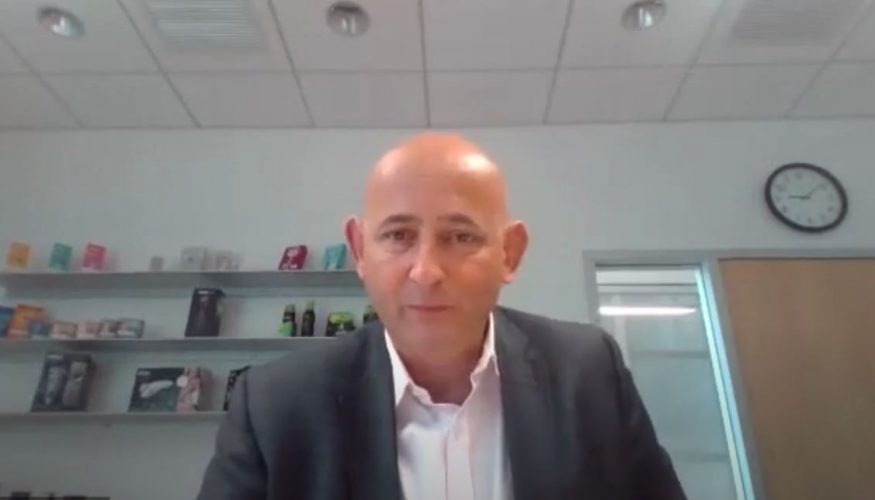Gillette head credits DEI efforts with company turnaround

By: Grant Welker
Gillette and its corporate siblings were struggling financially for the better part of a decade, hurt by a trend of men sporting beards — and thus not needing to shave often — and falling behind on innovation.
Gary Coombe, the CEO for grooming for Procter & Gamble (NYSE: PG) and the de facto head of Gillette, said on Tuesday that a more diverse and inclusive team at the South Boston-based razor giant has helped it reverse course.
“If you want to field the best team, you’ve got to pick from the whole squad,” Coombe said as the latest guest on the New England Council’s Inside the Corner Office virtual event series. “There’s so much talent out there that we weren’t accessing.”
Coombe said that Gillette has worked to overcome other challenges as well, from the popular unshaven look to a supply chain upheaval that is unlike anything he’s seen in his 36 years in the industry.
P&G has two manufacturing plants in Shanghai, the massive Chinese city that’s been under strict lockdown for weeks to limit the spread of coronavirus. Coombe said the company’s been able to work around that thanks to other plants spread across the world.
Then there’s the labor shortage, which Coombe said has made for a constant struggle to find workers for Gillette as well as sibling P&G brands like Venus and Braun.
“Finding talent with the right skills is a huge challenge,” said Coombe, who was named to the role in 2019. “It’s true in Boston, it’s true across the U.S., and it’s true across the world.”
The South Boston plant, which remains a manufacturing and R&D site, along with a plant in Andover are constantly struggling to find workers who are able to work with sophisticated technology and machinery, Coombe said. Partnerships with educational institutions, including Harvard, MIT and the Benjamin Franklin Institute of Technology help, he said.
“Unfortunately, you can’t just put a little poster in the window saying ‘We’re hiring,’” he said. “It’s not that simple anymore.”
Coombe, who grew up in London, has a long history with P&G dating to his time as a sales representative for the company’s soap and detergents lines in Britain’s East Midlands area starting in 1986. That history gives him a deep understanding of the company culture, a mutual trust with colleagues and a close relationship with the board, he said. But it can also make it harder to institute change, which he said was needed with the lagging Gillette brand.
“A transformation was required, and it sometimes can be harder to affect major change when you’ve been part of the system for so many years,” he said.
P&G’s grooming division was on a long and steady decline in sales before making a rebound last year. Net sales in 2021 of $6.4 billion for the unit represented its first year-over-year sales increase in the past decade. Gillette’s performance is not broken out separately.
In 2020, Gillette launched a new product line aimed at bearded customers called King C. Gillette, named after the company’s founder from more than a century ago. The Venus brand was overhauled two years earlier.
“Rather than keeping our fingers crossed and hoping beards went out of fashion, we thought, well, people need to groom beards. People who have beards still shave, right?” said Coombe, who is clean-shaven and sports a closely shaved head.
Decision-making for Gillette has also been less centralized to Boston. Gillette is in every country that it can legally operate in, Coombe said, and is the market leader in each one of those except for Japan.
“It’s a global business and it was somewhat hamstrung,” Coombe said of what he called a centralized and “somewhat autocratic” company.
Gillette is also emphasizing environmental-friendly practices, Coombe said. The company has pledged to be so-called net zero by 2040, meaning it would use renewable energy and take other steps so that the company has no greenhouse gas footprint. Each of Gillette’s plants runs entirely on renewable energy, and plastic packaging has been replaced with recyclable cardboard.
That latest step, Coombe said, is the equivalent of 90 million plastic water bottles annually.
“When you run a company that’s been around for 120 years, that history also has you think about the next 120 years,” he said. “We don’t want to just be around for the next 10 or 15. We’ve done 120. For sure, we want to do another 120.”
Read Full Article in the Boston Business Journal